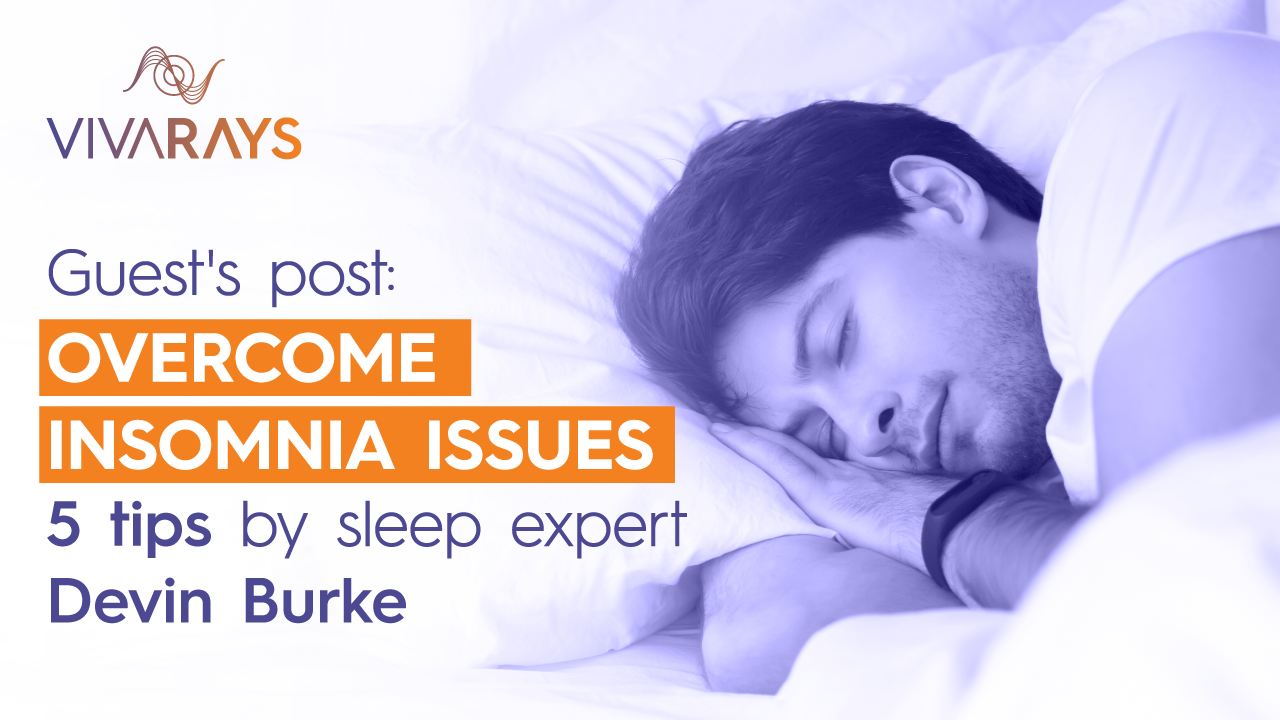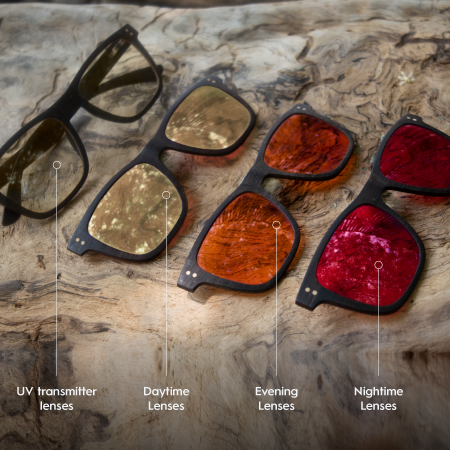Understand the real cause of insomnia with Devin Burke

Shedding Light on Insomnia and Sleep
Hello Vivascious, how did you sleep last night? At VivaRays, we prioritize going to bed early so we can serve you better. Now...
You’re used to our topics all relating to Light, right? Well, let’s speak about the time of the day when you’re supposed to be in total darkness. 🌚 In the circadian rhythm time frame when you want to attain lasting benefits for a better health.
This week on EduLight you got a sleep expert. Meet Devin Burke, a professional coach, teacher, and the founder of Sleep Science Academy. Devin will walk you through the topic of insomnia. So, in this blog edition, you'll learn:
what exactly is insomnia
what causes insomnia
what are the two types of it, and
which steps should you take to win the battle with sleepless nights.
Step in...🌜
We all experience occasional problems with falling or staying asleep. It can happen for many reasons and usually only affects a night or two of our rest. But, sometimes, it can last longer and become challenging to reverse, resulting in some form of insomnia.
This condition is the most common of all sleeping disorders, and over 40 million individuals in the US struggle with insomnia making their relationship with sleep worrisome. That worry creates anxiety, thus causing an escalating spiral of sleeplessness and its devastating effects.
What Is Insomnia?
According to the American Academy of Sleep Medicine, repeated difficulty with sleep initiation, duration, consolidation, or quality that occurs despite adequate time and opportunity for sleep and results in some form of daytime impairment are the indicators of insomnia.
In short, the inability to achieve sleep, even with sufficient opportunity for rest, negatively impacts your daily activities.
What Causes Insomnia?
Insomnia can arise for many reasons. There may be physical reasons for your insomnia, like illness, injury, certain medications, or a chronic condition like neuropathy. But, the most common source of insomnia are fear, doubt, and worry; In other words, anxiety.
An often overlooked factor exacerbating this anxiety is the artificial light in our environments.
This artificial light from LED bulbs and screens after sunset can elevate cortisol levels, the stress hormone, while simultaneously suppressing melatonin, our sleep hormone. As a result, our body struggles to recognize that it's time to unwind and relax, heightening feelings of anxiety and making restful sleep elusive.
The Two Different Types of Insomnia
Onset Insomnia is problems with falling asleep, and maintenance insomnia indicates difficulty staying asleep. And it is possible to have both or for the onset to become maintenance insomnia or vice versa. People will often slip back and forth between these two conditions.
The Three Subcategories
Transient Insomnia will last only a few days to a week or so and is typically a result of worry and anxiety over an event like a presentation, interview, or some other future concern.
When you become stuck in this paradox and don't know or understand how to solve your problem, it can become acute or short-term insomnia lasting for several weeks. Eventually, this condition will morph into chronic insomnia, which is trouble initiating sleep or staying asleep at least three nights a week for more than three months and affecting your daytime activities.
Chronic insomnia is prevalent, and sufferers are frequently unaware they have it.
Overcoming Insomnia
For many grappling with insomnia, the initial recourse is often to seek advice from a primary care physician. While this can be beneficial, it frequently culminates in a prescription for sleeping pills. Though intended for short-term use, these medications can sometimes lead to long-term side effects, dependency and potential addiction.
Consider embracing holistic methods to enhance your sleep:
- Establish a Solid Evening Routine: This sets the tone for a night of restful sleep. Engage in calming activities like reading or listening to soft music.
- Dim the Lights: As the evening progresses, dim the lights in your living space to signal to your body that it's time to wind down.
- Wear Evening Circadian Light Harmonizing Glasses: These glasses are designed to block blue light, helping maintain your natural circadian rhythm. Simply wear them after sunset before you switch to the nighttime glasses 2 hours before bed
- Wear Nightime Circadian Light Harmonizing Glasses: These glasses are designed to help you produce melatonin naturally. Simply wear them 2 hours before to experience deep, rdejuvinative sleep
- Practice Slow, Deep Breathing Before Bed: Deep breathing exercises can calm the mind and prepare the body for sleep.
- Journaling: Before settling down, jot down your thoughts or worries on a piece of paper. This simple act can free your mind from persistent anxieties, paving the way for a tranquil night.
By integrating these practices, you may find a more natural and sustainable path to overcoming insomnia and enjoying rejuvenating sleep.
Before you take any steps, you should first tap into the👇🏻
Understanding source of insomnia is essential for overcoming it
People living with Insomnia frequently attempt to control or force sleep, which worsens their plight because the more you try to control or force sleep to happen, the more stress and anxiety attach themselves to sleep and your sleep environment.
It can be a vicious and unrelenting cycle of sleepless nights and all the negative consequences of insufficient rest that impact virtually your entire life.
“The inability to achieve sleep, even with sufficient opportunity for rest, negatively impacts your daily activities.”
How do you escape this paradox?
Sleep is a natural state, just like breathing and your beating heart. With this in mind, the primary focus for battling insomnia is to relax your body so it can do what it knows how to do naturally – sleep.
To escape the paradox and reverse this unfortunate spiral, you must deal with the thoughts, beliefs, and perceptions (all of the psychological attachments you hold around sleep) causing the stress regarding sleep and what will happen if you can't fix it.
Often recognizing these challenges, accepting them for what they are, and consciously assessing their validity results in a lifting of the veil, freeing you from their oppression. When that happens, the anxiety slips away, allowing your body to relax and welcome natural sleep.
Final Thoughts
Insomnia and sleep have a complex and troublesome relationship that can make life difficult and cause significant health issues. The impact of poor sleep on your daily life, health, and outlook is detrimental and potentially catastrophic.
The challenges are the same, whether because of a future worry, the paradox of sleeplessness, a health issue, or insufficient exposure to sunlight. We must be honest in confronting these issues and be open to various methods and techniques to move past them.
Rather than a one-dimensional cookie-cutter program, Sleep Science Academy provides a proven and successful holistic science-based step-by-step program addressing both mind and body. Devin’s holistic multi-dimensional approach addresses insomnia's root causes for guaranteed lasting results.
Each client works with their personal certified holistic health and sleep coach, who guides and supports them through the process.
To experience a better night's sleep and enroll in Devin's academy (we highly recommend) book a free consultation.
We hope that the insights that Devin shared with us helped you to better understand your own being and take appropriate steps to overcome issues with insomnia.
Sleep soundly, wake up lively. One with nature, with the Rays of Viva ☀️




Leave a comment